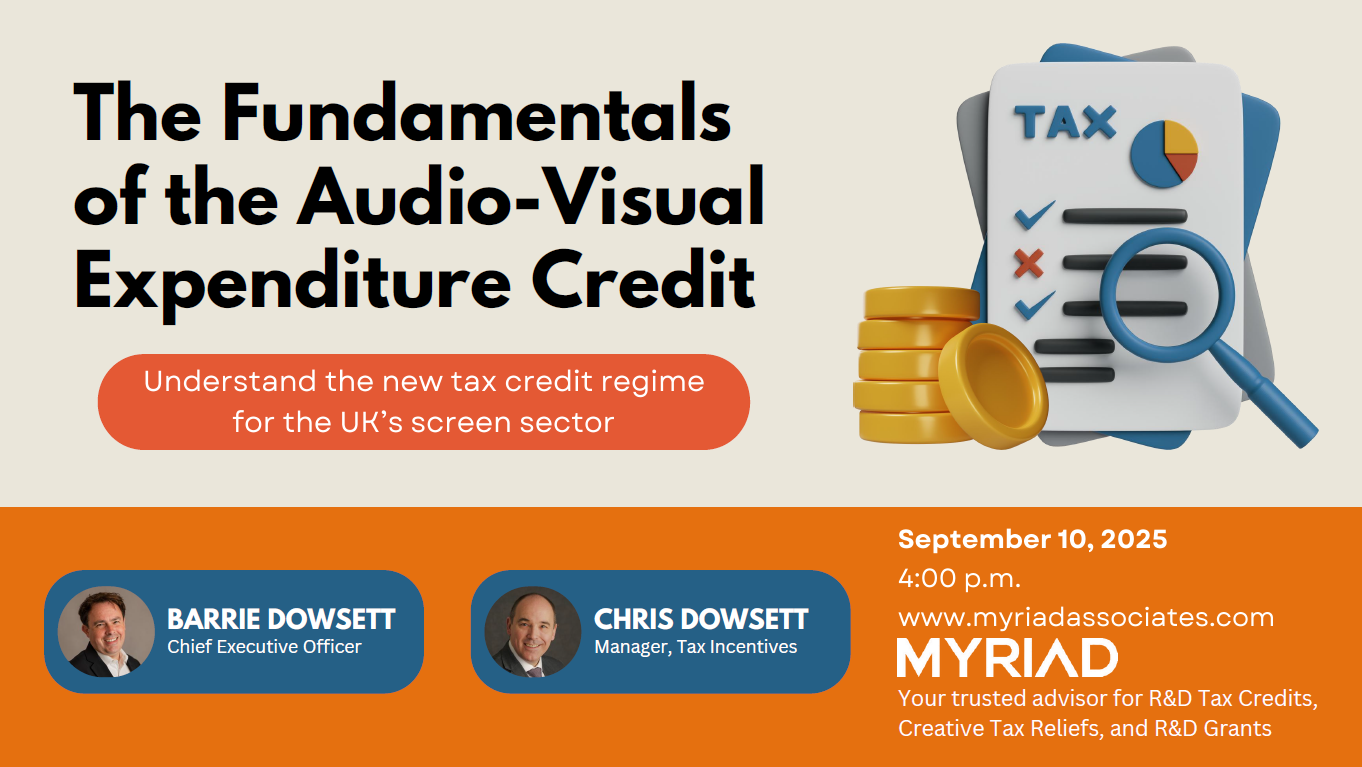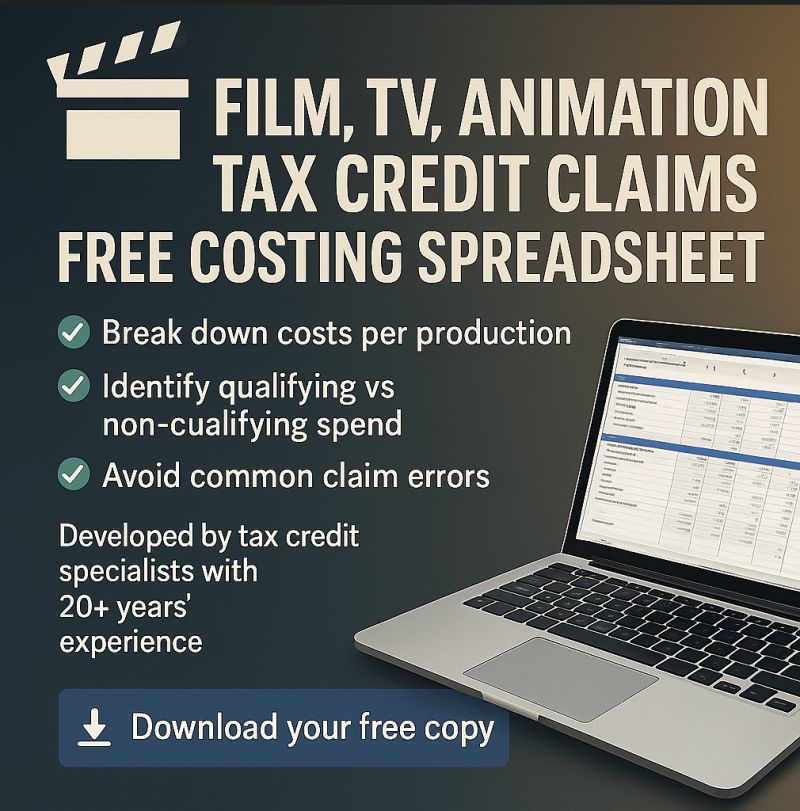
The Audio-Visual Expenditure Credit (AVEC), introduced in the Spring Budget 2023, replaces Film Tax Relief, High-End Television Tax Relief, Children’s Television Tax Relief, and Animation Tax Relief with a streamlined scheme featuring simplified calculations and broader qualification criteria.
Designed to make tax relief more accessible to producers in film and television, AVEC offers straightforward tax treatment for easier compliance.
Theatre Tax Relief, Museums and Galleries Exhibition Tax Relief, and Orchestra Tax Relief remain unchanged under their current frameworks.


The Audio-Visual Expenditure Credit provides generous tax relief for creative productions, offering 39% of qualifying expenditure for children’s TV, animations and visual effects costs, with a net benefit of 29.25% after corporation tax, and 34% for other films and TV programs, with a net benefit of 25.5%.
The Independent Film Tax Credit (IFTC) offers small producers an even higher rate of 53%, with a net benefit of 39.75%.
As an above-the-line credit, AVEC is taxable income, but it provides significant real-world benefits to creative businesses.
Production companies can claim AVEC on a portion of their core costs, which include pre-production, principal photography, and post-production. These activities don’t have to be completed directly by the production company; subcontractors can handle some tasks.
This means productions with 100% of costs in the UK can claim up to 80%, while productions with costs outside the UK can only claim the UK portion, provided it’s less than 80% of total costs.
There are four phases of development, according to the legislation:
The last three phases can be claimed as "core costs".
The key to when pre-production begins is knowing when the project was “green-lit”. Development activity is usually undertaken to determine whether the production is commercially feasible. Any expenditure in this stage is speculative in nature, even if it is eventually used in the production.
Production companies can claim AVEC if they meet specific criteria. Film production companies (FPCs) or television production companies (TPCs) can claim the AVEC on their productions, so long as they are responsible for:
The FPC or TPC must also actively participate in planning and decision-making and be responsible for contracting and paying for rights, goods, and services.


The AVEC must be used to pay off a company’s Corporation Tax liability first. If there is a remainder, it can be used to pay off other tax liabilities or it can be surrendered to other group companies.
If there is still a remainder after these steps, companies will receive a cash credit for the leftover. This needs to be worked out by the claimant before submission, as a self-assessed tax credit.
To qualify for Audio-Visual Expenditure Credit, films must:
If 51% of the core costs go to animation, the film qualifies as an animation (which comes with a higher rate of relief!).
The IFTC offers enhanced AVEC rates for films with core budgets under £23.5 million, starting production on or after 1 April 2024. To qualify, productions must meet standard requirements and have a British director or scriptwriter, or be an official British co-production.
Eligible TV programmes must:
A children’s programme targets viewers under 15 years old. To qualify as an animation, 51% of core costs must go to animation. Children's and animated TV has a higher rate of relief.
Drama, comedy, or documentary programmes must:
Excluded content includes ads, news, entertainment shows, live broadcasts, and training material.
To claim AVEC, production companies must treat each film or TV programme as a separate production trade. The following documents and information are required:
The claim itself is submitted as part of the Corporate Tax Return (CT600).


In our AVEC eBook, we explain how you can make the most of this valuable government programme.
✅ Eligibility Made Clear: Understand the requirements to qualify for the Audio-Visual Expenditure Credit, including certification as a "British" production.
✅Claiming AVEC Simplified: Learn the step-by-step process of preparing an AVEC claim.
✅Breakdown of Qualifying Costs: Discover which phases of production—pre-production, principal photography, and post-production—are covered and how costs are apportioned.
Key topics we'll be covering include:


Simplify your Audio-Visual Expenditure Credit (AVEC) claim with Myriad’s AVEC costing by trade spreadsheet, a powerful, structured template designed to help you satisfy both BFI and HMRC cost reporting requirements.
Key topics we''ll be covering include:

Myriad is your go-to partner for a successful Audio-Visual Expenditure Credit claim.
Our experienced team of application specialists, cost accountants, corporate tax experts, and AVEC consultants have a reputation for helping UK film and TV production companies unlock maximum value from government funding programs.
Let us help you claim AVEC for your project today!

The following types of TV programmes are ineligible for AVEC:
Drama, comedy, or documentary TV programmes must:
Definition of a drama or comedy:
A drama is a programme that consists wholly or mainly of depicting events depicted by one or more persons performing a role, whether by speech, acting, singing or dancing. Dramas may be based on fictional or non-fictional events. The definition of drama includes comedies, provided they meet the description above.
Definition of a documentary:
A ‘documentary’ is a programme that depicts actual events, places or circumstances and is primarily intended to record or inform, so long as it is not a drama.
Entertainment programmes with informative elements that are not the main focus are not documentaries for AVEC.
Docudramas only need to meet one of the definitions to be eligible.
The IFTC offers an uplift of 53% compared to the normal rate of 34% for other productions. Lower-budget productions are eligible for this higher rate of relief, subject to meeting the requirements for the scheme.
Productions with core budgets (i.e., expenditure on pre-production, principal photography and post-production of the film) of up to £23.5 million can also claim the IFTC.
The film must meet the minimum criteria of a British film.
The films must also have a “Modified Creative Connection”, which means that the director and/or scriptwriter must be a British citizen or resident, or it must be an official British co-production.
All productions must be certified as British. For the vast majority of cases, this means passing the Cultural Test as administered by the British Film Institute (BFI).
The only exception to this rule is for co-productions.
Official co-productions are a national film or TV programme in the United Kingdom under an agreement between the UK Government and any other government, international organisation or authority.
Co-producers don’t need to meet all the requirements of a standard production company; they only need to be considered co-producers officially and make an effective creative, technical and artistic contribution to the film or programme.
Qualifying co-productions can be considered ‘British’ under a different definition; they must have a minimum of 10% of the total core costs (across all partners) in the UK, but do not need to pass the BFI's Cultural Test.
In most cases, your production must be certified as British by passing the British Film Institute (BFI) cultural test.
To pass the BFI cultural test, complete an online application form for each production for which you want to claim AVEC. The BFI will assess your application and award points based on the cultural content of the production, its cultural contribution, its cultural hubs, and its cultural practitioners.
You will need to achieve 18 (16 for animations) of a possible 35 (31 for animations) points to pass.
Myriad employs BFI application specialists who can help you pass this test. Contact us for advice.
BFI is currently reporting 8-10 weeks to process submitted applications.
Delays may occur if application forms are not correctly completed or need further information. If you need the certificate by a specific date, make sure you apply in good time and specify your deadline date on the application.
A Letter of Comfort: If you’re not yet ready to complete a cultural test application, you can submit a draft application and receive a Letter of Comfort from the BFI. This letter will state that the production should pass the cultural test. A Letter of Comfort can’t be used to submit a AVEC claim to HMRC, but it is reassuring to have and can help you secure financing.
An Interim Certificate: You can apply for an Interim Certificate if your production is not yet finished. An Interim Certificate will be issued once the BFI and the Department of Culture, Media and Sport (DCMS) are satisfied that your production will pass the cultural test based on the proposals set out in your application.
A Final Certificate: A final certificate proving your production is British will only be issued after it is finished and ready for release. Therefore, applications for a final certificate should not be submitted before the production has been completed.
The Accountant's Report is required when an application claims points in Section C and/or Section D.
The Accountant's report aims to verify the total and UK expenditure of the work in Section C and the nationality or residence of all persons in Section D.
The Accountant's Report must be prepared by a person eligible for appointment as a company auditor under section 1212 of the Companies Act 2006.
A report can cost between £500 and £2,000 per application, depending on the production costs and the number of applications you submit.
The BFI cultural test regulations require you to make a statutory declaration which states that the information you’ve given in your application is accurate.
A statutory declaration is required for both the Interim and Final certifications.
The statutory declaration must be made before a practising solicitor, general notary, Justice of the Peace or an officer authorised by law to administer a statutory declaration under the Statutory Declaration Act 1835.
Some production companies may be carrying out research and development alongside their film or television production.
A company can claim AVEC and R&D tax relief; however, the two schemes cannot be claimed on the same expenditure. Where AVEC is claimed on a specific cost, the production company can’t claim for any other reliefs (including R&D tax relief) for that cost. This means that if a production company chooses to claim AVEC, any research and development within the AVEC project wouldn’t qualify.
If a company can separate the R&D work from the film or TV production into separate projects with distinct expenditures, the two reliefs can be claimed within the same accounting period.
For example, developing a new type of pyrotechnic for a specific shot may be claimed under R&D tax relief, whilst the larger production would be claimed under AVEC. This would be true even if the pyrotechnic were used in the production, so long as no costs were claimed twice.
Your accounting period will determine the R&D tax relief scheme you can claim through.
The key to when core costs can be claimed is knowing when the project was “green-lit”. Development activity is usually undertaken to determine whether the production is commercially feasible. Any expenditure in this stage is speculative in nature.
Expenditure can be claimed once it is clear that the production will go ahead. Some production companies may have done very little conceptual development before production, and some may have spent more time assessing its commercial viability.
AVEC can no longer be claimed once the production is in a state where it can be broadcast. Commercialisation activities are no longer eligible, even though they may be crucial to a production's success; they are activities following when a production could be released to the public.
Core expenditure must be apportioned on a “fair and reasonable basis". There are multiple ways you can define this, depending on the cost. You may wish to explain your methodology to HMRC to ensure you meet this criterion.
As with core and non-core expenditure, you will need to apportion UK and non-UK expenditure. Workers based in a UK office or working remotely in the UK can be included, but workers physically outside of the UK are ineligible. This applies regardless of where the company is based, the worker’s nationality or whether the company is in a group with the claimant.
For some costs that are partly based in the UK, you can choose how to apportion the cost. A staff member that works partly in the UK will only be eligible for the number of days they are working in the UK.